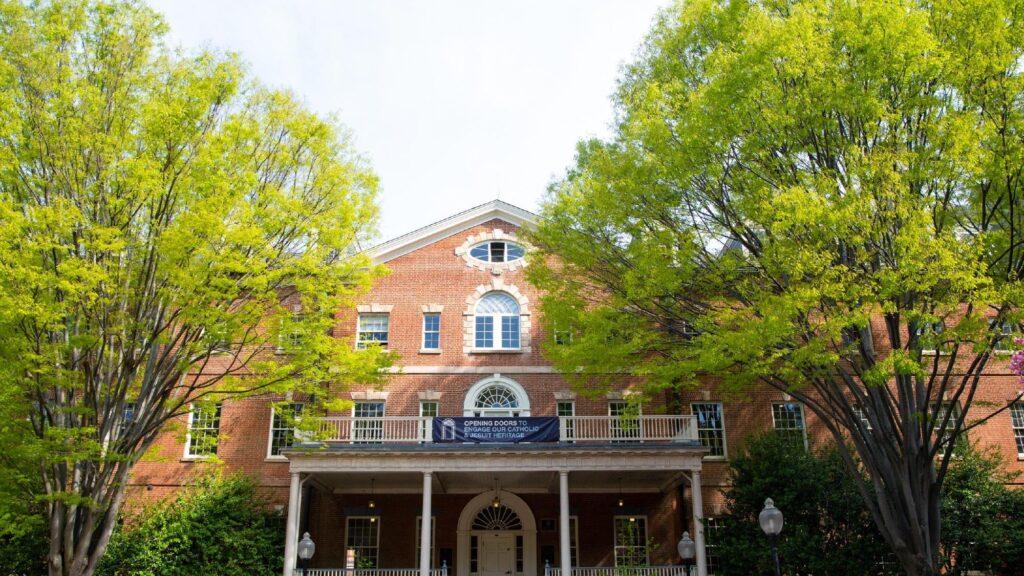National Public Radio (NPR) journalist Ayesha Rascoe’s newest pursuit started with a simple question: “Where are these stories?”
Rascoe leads an NPR series titled “The Civil Rights Generation,” where she interviews lesser-known guests about their experiences during the U.S. civil rights movement of the mid-20th century. She joined Eugene Scott, a 2018 Georgetown Institute of Politics and Public Service Fellow, in a March 28 conversation hosted by GU Politics, an academic center devoted to preparing students for careers in public service, and the Georgetown Journalism Program.
Rascoe said her series emerged from a desire to explore the stories of those involved in the civil rights movement who never had a chance to share or record what they witnessed — the unnamed figures who hold untold but important stories.
“Sometimes you lose the humanity of these people,” Rascoe said at the event. “And the civil rights movement, what made it so powerful, is that it wasn’t just these very prominent people, but it was everyday people who were standing up and doing their part.”
Rascoe said that for many who lived through the staunch segregation and discrimination that marked the mid-20th century, it may be difficult to talk about the trauma they experienced. In 1970, when a black man was killed outside a store in downtown Oxford, N.C., the murderers were never charged.
Despite this, she was able to sit down and interview her own family members, primarily her mother and uncle, and said she learned many new things about their lived experiences.

Rascoe and her family grew up in Oxford, N.C. When her uncle was a child, he was one of the Black children integrating into a previously all-white school amid bomb threats. Even after integration, he rode on a segregated bus.
Addison Goodman (COL ’24), who attended the event, has aunts and uncles who went to segregated schools in Tallahassee, Fla., a hotbed for racial violence during the civil rights movement.
“They never, ever talk about it unless me, who’s very interested, asks,” Goodman told The Hoya. “I always think of my grandma and my great aunt who had passed away, and I always think of how all those stories are lost, but not really, because my parents and their older siblings lived through all that.”
Although time has passed, Rascoe said the vestiges of racism are hard to wash away. Her own homecoming court was segregated, and her grandmother, who grew up in North Carolina and later moved to New Jersey, said trauma from her past impacts her to this day.
“If you said something to the wrong person, they would kill you,” Rascoe told The Hoya. “You could just tell, even in her 80s, it was so fresh in her mind. Like that you cannot do these things, like this was not a game. This was life or death. That doesn’t leave you.”
Scott spoke about the implications of recent efforts to censor the history of the civil rights movement, namely through the Parental Bill of Rights, legislation that recently passed the U.S. House that would enable banning books related to the movement.
“We never fully can tell just how inhumane this period of our country’s history was,” Scott said at the event. “And we risk even losing the most sanitized versions of these stories because of these book bannings.”
Rascoe said that while she doesn’t interview those who fought against the civil rights movement, these are also stories that need to be told in order to better understand the brutality of what occurred.
“I do think that one of the big problems is that you hear these stories about the civil rights era and what happened, and then it’s almost as if everyone who’s doing the oppressing, the earth swallowed them up, and they’re never heard from again,” Rascoe said.
Rascoe and Scott also discussed how the journalism industry has changed for Black writers in the last decade.
“I don’t know that Black journalists 10 years before us had the freedom to speak this openly about racism being bad,” Scott said.
Rascoe’s series is ongoing; she still has a few stories left to tell.
“We have a fight right now over the history that we’re being told, and so I think it’s just more important than ever that as many outlets and books and podcasts as possible just set the record straight and make a record so that somebody can find it somewhere. Because they may not get it in the classroom,” Rascoe said.




















